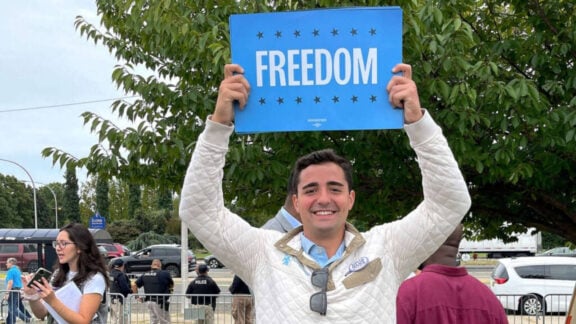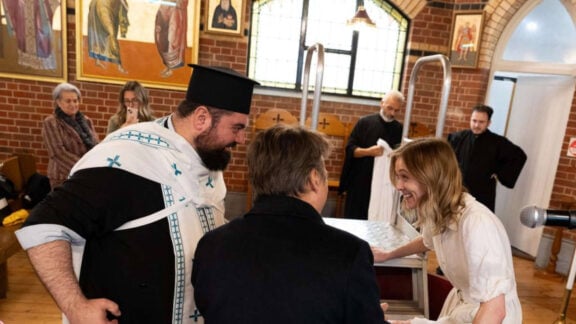It is 28 years since now-retired couple John and Mary Hayes sunk roots in Neohori (in the West Mani). And while the village has still retained the charm that drew them there in the first place, they have also witnessed many changes on the peninsula.
The region had seen many of the original people move out of the Mani to seek their fortunes in Athens or the United States and Australia leaving behind houses that either fell into disrepair or have been sold and renovated by people mainly from northern Europe, or Britain as was the case with John and Mary.
Mr Hayes told Neos Kosmos that the couple, both former geography teachers, have, but for the pandemic, tended to split their time between their home in Greece and their English home in north Devon. He recounts his experiences in his first book Greco Files.

For many years the couple taught in big London schools before making a big decision to give up city life and move to the rural Devon. “Working in big city schools taught us a lot but it was quite a shock coming to work in the smaller, rural schools. It was quite demanding in a different way. We love the big city but this is where we are and we have the bonus in having the Mani to go to,” Mr Hayes said.
The rural communities of Devon and Neohori had a lot in common he said.
“They are both very genuine, down to earth, friendly open and welcoming – primary human characteristics. The big difference is the climate.”

Moving to Neohori
Mr Hayes said he had first travelled to Greece in 1969 with a group of friends. For at time they hired a villa in Hydra.
“We were footloose and fancy free with no children. Hydra was the place to be – the ‘jewel of the Saronic Gulf’.”
The couple returned to England, settled down and began their family. Each summer they would travel across Europe and the United States. They took the children on holidays to Halkidiki and Corinth. And in 1991 they decided that they would like to live in Greece.
“We were in Stoupa (near Neohori) queueing up to go on a bus trip to Olympia when we saw a little flyer advertising houses for sale. I asked Mary what she thought and she said ‘ye’.”
The flyer was from estate agent Susan Shimmin, a long-time English resident of the area and she helped them to find the house that they bought in 1994 and renovated.
“There had been a lot of depopulation after the war so there were many empty houses,” Mr Hayes said. The house that they had bought had not been occupied for 10 years but it met their criteria: a sound building with a good roof and it was set within the village.
“We wanted to be in the middle of a Greek village and not live in an isolated estate,” he said.
Learning Greek
They were not the first expats to live in the area and over the years more and more people have come to live from Northern Europe as well as Greeks from the diaspora.
“There are Scandinavians, Germans, Austrians and a fair number of Brits. Not everyone is retired and some are younger couples who have brought they kids and have enrolled them in the local Greek schools. Some are in the building trade as electricians, plumbers and carpenters some are craftspeople. One friend has set up a jewellery workshop of her own.
“The big issue is language and there are people who have full-time jobs but who barely speak beyond very basic ‘tavern Greek’. Not having Greek is not a big drawback but it does exclude you in some way.”
The Hayes were determined to learn Greek and continue after 28 years to attend weekly lessons in the language with their teacher who is also a firm family friend.
“We are competent with reading and writing but speaking it is so much more demanding,” he said.
Changes over the years
His book, as well as being a personal memoir, is also a commentary of the events he experienced in Greece. Two of the key changes that he has noted over the years is the way Greeks conduct business and communications.
In the early 1990s he said, most transactions were carried out using cash. Credit and debit cards and bank transfers were not the way things were done then.
Back then it was harder to communicate with the family in England with weekly telephone calls after queueing up at the local kiosk being the norm.
“Now it is just so easy, so straightforward,” Mr Hayes said.
Another major change that he has noted is the relative ease of travel compared to his early years in the Mani.
‘When we first settled in Neohori, it would take six-and-a-half hours by train from Athens. Now it is under three hours on an express bus on the motorway.”
He said that despite the pandemic, tourism to the region had not suffered because more Greek tourists came.

Over the years, Mr Hayes facilitated the sale of the local olive oil to the UK.
“We took some five-litre containers with us to Devon and decanted the oil into bottles and labelled them to give to family and friends as presents. Their reaction was amazing and within 18 months we went to several plate loads being shipped over for sale.”
They also sold Kalamata olives and set up a website to facilitate sales.
“It was a most enjoyable period as we really felt part of the community and learnt many things about olive growing and processing. We also gained many friends in Greece and the UK in the process.”
Six years ago, when he reached 70, he called it a day on the olive business but looks to returning to Neohori on a more regular business- COVID permitting.
At present he is working on promoting Greco Files. having attended a book festival in Greece last year and working through friends to promote the book in North America.
His book is aimed at the thousands of British and Irish expats who have settled in Greece and also for the “many Brits who aspire to relocate to a place in the sun”.
♦ Greco Files by John Hayes is published through Matador which is part of Troubador Publishing. It is available online through Amazon, Booktopia and other sites and is available as an ebook.









